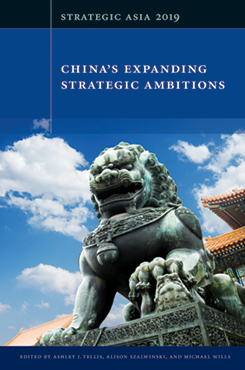Power vs. Distance
China's Global Maritime Interests and Investments in the Far Seas
This chapter argues that China’s maritime power projection will occur along a continuum of national interests and capabilities that diminish dramatically with distance and could be subject to slowing, setbacks, or even outright reversal.
Executive Summary
MAIN ARGUMENT
Under Xi Jinping’s ambitious emphasis on national rejuvenation, China is growing in all dimensions of national power, acquiring increasingly far-flung interests overseas. It is facing mounting domestic and international pressure to address them with unprecedented capabilities, particularly with its rapidly developing navy, and is allocating increasing resources with which to do so. Yet approaching and sustaining the remarkable U.S. constellation of global support capabilities that allow the U.S. to engage in combat operations against another major military worldwide seems unrealistic for China—even looking out over decades—given both the uniquely favorable opportunities that the U.S. has enjoyed and China’s geographic liabilities. Moreover, in its fourth decade of sustained growth in national power, China faces increasing headwinds that will likely slow its future progress overseas, as well as internal risks that may even draw it inward. Even if China becomes convulsed by internal problems, its very disarray could subject its immediate neighbors lacking significant sea buffers to tremendous challenges.
POLICY IMPLICATIONS
- To counter China’s expanding maritime presence, the U.S. should carefully cultivate its global network of alliances and partnerships, which is a unique strength offering unparalleled influence, access, and power projection.
- Particularly for worst-case scenarios, U.S. decision-makers must consider how to leverage China’s strong power-distance gradient to shape its behavior across a full spectrum of contingencies.
- U.S. planners must address enduring technological imbalances and invest accordingly in capabilities to counter China’s military counterintervention approaches while targeting its vulnerabilities.
Andrew S. Erickson is a Professor of Strategy in the China Maritime Studies Institute at the U.S. Naval War College.
Strategic Asia
The Strategic Asia annual edited volume incorporates assessments of economic, political, and military trends and focuses on the strategies that drive policy in the region. Learn more about Strategic Asia.



